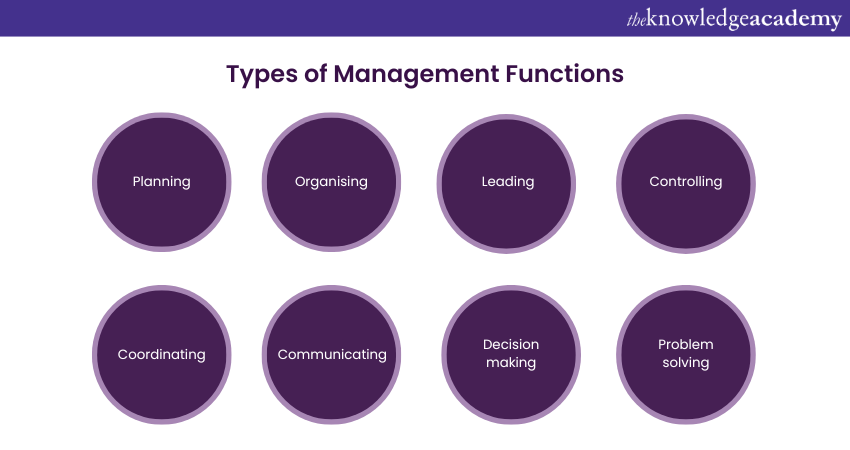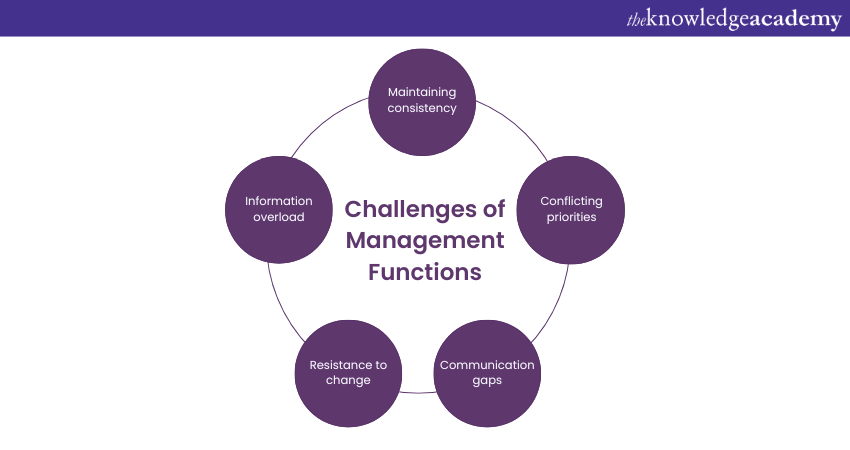We may not have the course you’re looking for. If you enquire or give us a call on +44 1344 203 999 and speak to our training experts, we may still be able to help with your training requirements.
We ensure quality, budget-alignment, and timely delivery by our expert instructors.

Effective management is the cornerstone for achieving success and driving organisational growth in the fast-paced and ever-evolving business world. Whether it's a small startup or a multinational corporation, there are some Functions of Management that are pivotal in steering businesses towards their desired goals.Management Functions encompass interrelated activities that form the essence of the managerial process. These functions provide a systematic and structured approach to managing resources, making decisions, and coordinating efforts towards attaining specific targets. Want to learn more about these key components of Management? Read this blog to learn about the Functions of Management, their types, advantages and challenges.
Table of Contents
1) What are the Functions of Management?
2) Functions of Management: Its types
3) Advantages of Management Functions
4) Challenges of Management Functions
5) Tips for applying the four Functions of Management
6) Conclusion
What are the Functions of Management?
The Function of Management have a significant impact on the attainability of businesses by carrying out and enhancing their operations. Companies could maximise their efficiency in performance and generate a sustainable expansion by using resources effectively of all kinds, such as human resources, financial assets and technologies.
The Functions of Management, guided by a Management Model, act as a navigating beacon, ensuring that courses of action and strategies are in line with the long-term desires of an organisation. The planning brings up possible hurdles that are then considered, and their solutions are devised. Organising teams in a way that they will excel is an effective way of leading.
In addition, Leadership, which is one of the basic Functions of Management, does the same job through motivation and encouragement to push individuals beyond their known limits and enable them to participate in collective success.

Functions of Management: Its types
Functions of Management are the fundamental processes that managers perform to achieve organisational goals efficiently. They serve as a roadmap, guiding the managerial process from inception to execution, and their proper implementation is crucial for long-term success. The following are the key Management Functions:

Planning
Planning, the key that opens doors to the rest of the Management processes, is the starting point for all these activities. It encompasses setting the mission, vision, and long-term goals of the organisation.
The executives focus on a detailed examination of external and internal factors to determine the strategies for the desired objectives. A successful plan covers the medium and long-term, avoiding issues, spotting chances, and providing as many facts as possible for decision making.
Organising
The Organising Function consists in constructing an organisational structure, which will be efficient and will work well. This involves distribution of tasks, design of structure and definition of position and duties, as well as distribution of assets to different departments and people.
Effective communication and collaboration can be promoted by a well-structured planning as it will eliminate redundancy and thereby result to a cohesive environment. Moreover, organising implies setting up lines of charge and reporting and clear divisions of authority and accountability.
Leading
Leadership is an important function concerned with guiding and propelling people or teams to accomplish their organisational ambitions. Great leaders are those who motivate, encourage, and reinforce their teams to create a working environment based mainly on truth, mutual understanding, and commitment.
Managers utilise Leadership Skills to become visionary where they show employees to real picture how their contributions add up in the collective vision. Teamwork plays a major role in the innovation and creativity field as it encourages idea sharing and makes the team members feel valued.
Ready to lead? Begin your management journey with our Introduction To Management Course.
Controlling
Control can be defined as the function to evaluate, and monitor completed activities against established requirements. It is the act of measuring the performance with predefined benchmarks, finding the deviations and then making the necessary changes.
When discrepancies are detected, managers take corrective action to bring performance back on the flag. Control does not entirely relate to rectification of the poor performances, but also the reinforcement of positive performances. The role of this function can be considered as a cornerstone of the flexibility and adaptability of the company with respect to the changes.
Coordinating
Coordination is inherent for Management, but it can get un-identified as a separate function. It is the process which implies that there should be a coordinated mode of operations for different departments and teams.So that all their activities correspond to the organisational objectives. Good coordination results in collaborative work, standardises the processes, and reduces confusion, which ultimately leads to the greater productivity.
Communicating
Communication is a critical part that forms links among all Management Functions. Clear and efficient communication is a cornerstone of successful planning, organising, leading, and controlling.
Managers communicate and share smart goals, expectations, and feedback to their teams, organisations, as well as other key stakeholders. Additionally, they not only actively hear, but also understand others' concerns and viewpoints. As a result, they ensure that their environment will be open and honest.
Decision making
Decision-making is one of the crucial Functions of Management. Managers spend the bulk of their time making choices that determine the direction and success of the enterprise.
Influential decisions entail all the stages of a Decision-making Process, such as information gathering, analysis of alternatives, risk assessment, and consequences prediction. Rational decisions are based on appropriate information that results in improved performance and the organisation can expand.
Empower your team and yourself! Join our Introduction To Managing People Course and turn you into a people-focused leader.
Problem solving
Decision Making and Problem Solving go together. Managers should focus on finding the bottlenecks and barriers to their development. What is solution if not the confluence of cause-and-effect analysis, bold ideas, and team efforts that produce creative solutions?
Advantages of Management Functions
The Functions of Management are the backbone of effective and efficient business operations. Here's how:Planning helps in setting objectives and determining the best course of action to achieve them. Organising ensures efficient allocation of resources and assignment of tasks. It helps create a structure that facilitates the accomplishment of goals.
Further, leading motivates and influences employees to enhance productivity and morale. Finally, controlling monitors performance, ensuring activities align with plans and enabling corrective actions when necessary. Collectively, these Functions of Management improve operational efficiency, enhance decision-making, and drive strategic alignment. They ultimately contributing to sustained organisational success.
Take your Leadership skills to the next level with our Senior Management Training - join today!
Challenges of Management Functions
In this dynamic and competitive business world, the Functions of Management play a vital role in helping the company manage and enhance its operations. While these functions have several benefits, they also have several challenges. The following are some of the key challenges:

a) Information overload: In the digital age, managers often face information overload, making it difficult to process and analyse relevant data for planning purposes.
b) Resistance to change: Employees might resist implementing new plans and strategies. This resistance might be the strongest from older employees accustomed to existing practices, leading to delays and reduced enthusiasm for change.
c) Communication gaps: Miscommunication and misunderstandings between different departments can hinder effective coordination.
d) Conflicting priorities: Departments or teams may have conflicting priorities or objectives, making aligning efforts towards common goals challenging.
e) Maintaining consistency: Coordinating activities across diverse teams and locations requires consistent communication and effort to ensure uniformity.
New to management? Elevate your managerial capabilities with our specialised Management Training for New Managers Course.
Tips for applying the four Functions of Management
Effective Management relies on mastering the four fundamental functions: planning, organising, leading, and controlling. However, one must learn how to excel in these areas. Here's how:
a) Planning: Start with clear objectives and develop comprehensive strategies to achieve them. Utilise forecasting and SWOT analysis to anticipate challenges and opportunities. Regularly review and adjust plans as needed to stay aligned with organisational goals.
b) Organising: Establish a clear structure and allocate resources efficiently. Define roles and responsibilities, fostering collaboration and accountability. Utilise tools like organisational charts to visualise hierarchies and communication channels.
c) Leading: Inspire and motivate employees to perform at their best. Practice effective communication, Active Listening, and empathy. Lead by example, demonstrating integrity and professionalism. Provide mentorship and opportunities for professional development.
d) Controlling: Implement systems to monitor progress and ensure adherence to standards. Set clear performance metrics and regularly assess outcomes. Take corrective action when necessary, addressing deviations from plans and fostering a culture of continuous improvement.
Conclusion
Management Functions form the essence of successful business management, providing a systematic and structured approach to achieving organisational goals. The Functions of Management, like planning, organising, and leading, help companies navigate the complexities of the modern business landscape with clarity and purpose. Each function is crucial in driving the organisation's efficiency, productivity, and innovation.
Unlock your Leadership potential with our cutting-edge Management Courses. Elevate your skills, lead with confidence, and drive success.
Frequently Asked Questions
What are the 4 basic Functions of Management?

The four basic Functions of Management are planning, organising, leading, and controlling. They encompass activities related to setting objectives, allocating resources, inspiring others and monitoring performance.
Which Management Function is most essential to a business' success?

All management functions are vital but planning stands as the cornerstone of success. It establishes direction, sets objectives, and guides decision-making, laying the foundation for effective organisational performance.
What are the other resources and offers provided by The Knowledge Academy?

The Knowledge Academy takes global learning to new heights, offering over 3,000 online courses across 490+ locations in 190+ countries. This expansive reach ensures accessibility and convenience for learners worldwide.
Alongside our diverse Online Course Catalogue, encompassing 19 major categories, we go the extra mile by providing a plethora of free educational Online Resources like News updates, Blogs, videos, webinars, and interview questions. Tailoring learning experiences further, professionals can maximise value with customisable Course Bundles of TKA.
What is the Knowledge Pass, and how does it work?

The Knowledge Academy’s Knowledge Pass, a prepaid voucher, adds another layer of flexibility, allowing course bookings over a 12-month period. Join us on a journey where education knows no bounds.
What are related Courses and blogs provided by The Knowledge Academy?

The Knowledge Academy offers various Management Courses, including Management Training for New Managers Course, Introduction to Management Course and Introduction to Managing People Course. These courses cater to different skill levels, providing comprehensive insights into Delegation of Authority.
Our Business Skills Blogs covers a range of topics offering valuable resources, best practices, and industry insights. Whether you are a beginner or looking to advance your skills, The Knowledge Academy's diverse courses and informative blogs have you covered.
Upcoming Business Skills Resources Batches & Dates
Date
 Introduction to Management
Introduction to Management
Fri 11th Apr 2025
Fri 13th Jun 2025
Fri 8th Aug 2025
Fri 10th Oct 2025
Fri 12th Dec 2025






 Top Rated Course
Top Rated Course


 If you wish to make any changes to your course, please
If you wish to make any changes to your course, please


